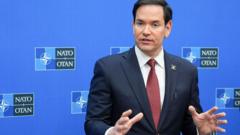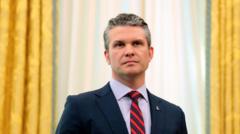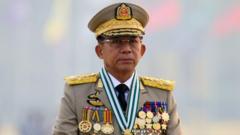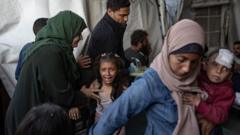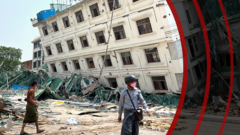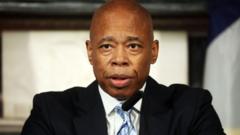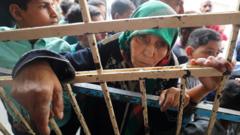In the wake of a devastating earthquake in Myanmar, Secretary of State Marco Rubio faces criticism but maintains that the U.S. is balancing various global priorities while encouraging other nations to contribute more aid.
Rubio Defends US Stance on Myanmar Earthquake Aid Amid Criticism
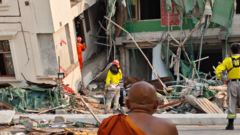
Rubio Defends US Stance on Myanmar Earthquake Aid Amid Criticism
Secretary of State addresses concerns over humanitarian response following recent seismic disaster.
Given the recent tragic earthquake in Myanmar, which has claimed over 3,000 lives, U.S. Secretary of State Marco Rubio has addressed growing concerns regarding the country's perceived lack of significant humanitarian response. Critics have pointed to the dismantling of the U.S. Agency for International Development (USAID), which they believe has hindered the ability of the U.S. to deploy essential rescue operations.
During an interview with the BBC, Rubio stated, "We are not the government of the world," emphasizing that while the U.S. aims to assist, it must also prioritize domestic interests and strategic global commitments. "There's a lot of other rich countries in the world, they should all be pitching in," he added.
The earthquake, registering a magnitude of 7.7, created widespread devastation, and former USAID officials criticized the actions of the Trump administration which cut funding to humanitarian efforts. According to these former officials, vital logistics contracts have been canceled, and personnel necessary for emergency deployment were let go.
Despite this, Rubio asserted that the U.S. is still engaged in the crisis, noting, "We'll help as much as we can… but it's not the easiest place to work; they have a military junta that doesn't like us." He reiterated that a small team of U.S. advisors is being sent to the disaster zone, which could assist in the humanitarian response.
Former officials from USAID have claimed that the U.S. typically would dispatch up to 200 rescue workers alongside specialized equipment in response to such disasters, making the current limitations all the more pronounced. Rubio, however, shifted some blame towards Myanmar's ruling military for restricting access to aid.
Rubio's remarks came against a backdrop of additional criticism directed towards non-government organizations (NGOs). He stated, "We are not going to fund these global NGOs all over the world that are living off of this," suggesting a pivot towards greater collaboration with local governments and NGOs directly aiding the efforts.
As the global community watches closely, Rubio’s comments reflect a conscious effort to manage expectations regarding the U.S. role in humanitarian crises, especially in politically sensitive regions such as Myanmar. He concluded by urging other nations, including wealthy neighbors China and India, to also take action in providing assistance.
During an interview with the BBC, Rubio stated, "We are not the government of the world," emphasizing that while the U.S. aims to assist, it must also prioritize domestic interests and strategic global commitments. "There's a lot of other rich countries in the world, they should all be pitching in," he added.
The earthquake, registering a magnitude of 7.7, created widespread devastation, and former USAID officials criticized the actions of the Trump administration which cut funding to humanitarian efforts. According to these former officials, vital logistics contracts have been canceled, and personnel necessary for emergency deployment were let go.
Despite this, Rubio asserted that the U.S. is still engaged in the crisis, noting, "We'll help as much as we can… but it's not the easiest place to work; they have a military junta that doesn't like us." He reiterated that a small team of U.S. advisors is being sent to the disaster zone, which could assist in the humanitarian response.
Former officials from USAID have claimed that the U.S. typically would dispatch up to 200 rescue workers alongside specialized equipment in response to such disasters, making the current limitations all the more pronounced. Rubio, however, shifted some blame towards Myanmar's ruling military for restricting access to aid.
Rubio's remarks came against a backdrop of additional criticism directed towards non-government organizations (NGOs). He stated, "We are not going to fund these global NGOs all over the world that are living off of this," suggesting a pivot towards greater collaboration with local governments and NGOs directly aiding the efforts.
As the global community watches closely, Rubio’s comments reflect a conscious effort to manage expectations regarding the U.S. role in humanitarian crises, especially in politically sensitive regions such as Myanmar. He concluded by urging other nations, including wealthy neighbors China and India, to also take action in providing assistance.

